Opinion
WHITHER BUHARI IN THE NIGER – ECOWAS – NIGERIA IMPASSE?

By Tunde Olusunle
Nigeria’s northern geopolitical neighbour, Niger Republic, was effectively an annex of our country under the rulership of the immediate past President, Muhammadu Buhari. At every given opportunity, Buhari never failed to advertise the consanguineal connectivities between him as an individual, and Niger Republic, and indeed between his traditional sociocultural origins in Daura in Katsina State, and Maradi prefecture in Niger Republic. He confirmed he had cousins across the Nigerian border and even threatened to relocate to Niger if he suffered any discomfiture from Nigerians, as he disembarked from office in 2023. Buhari and his Nigerien counterpart who shares a slightly moderated first name with him, Mahamadou Issoufou, both signed an agreement in July 2018, for Nigeria to extend oil pipelines to Niger, and to build a refinery in that country, at the cost of $2Billion, fully bankrolled by Nigeria.
Under Buhari, a 286-kilometre long rail line to connect Nigeria and Niger, was approved by Buhari’s federal executive council, (FEC), in September 2020. The Kano- Katsina- Jibiya- Maradi rail link is costing Nigeria a staggering sum of $1.959 Billion. Buhari’s successor, Bola Tinubu inherited the project which was 35 per cent completed in 2023, and is proceeding with its completion. It should be ready before the end of 2026. The June 2021 edition of a publication which goes by the name *The Africa Report,* indeed asked a rhetorical question, occasioned by Buhari’s obsession with Niger, and Nigeria’s glaring economically lopsided investments in the desert nation. The document inquired: “What is it about Buhari’s passion for his northern neighbour, the Republic of Niger? Is it economic or commercial logic, altruism or just family and ethnic ties?” Buhari’s spokesman, Femi Adesina in a February 10, 2021 edition of *Arise News* proffered that: “Jibiya and Maradi constitute a significant trading core between Nigeria and Niger Republic dating back many centuries. This vital infrastructure will establish an end-to-end logistic in railway transport services before northern and southern sections of the country, reaching Nigeria’s southern ports of Lagos and Warri.”
Added to these prodigal investments in a virtual wasteland was Buhari’s procurement of sports utility vehicles, (SUVs) valued at *$2.7million* for senior government officials in the employ of Niger Republic, in August 2021. Buhari during his years as helmsman, practically developed Niger with Nigeria’s commonwealth at a time Nigerians were suffering, and are still groaning from the buffeting spinoffs of multisectoral lack, deprivation, hunger, insecurity and despair, precipitated by his leadership. Ochereome Nnana, respected columnist with Nigeria’s *Vanguard* newspaper, provided insights into Buhari’s consangiunity with Niger Republic in the November 25, 2020 edition of his column. His words: “Buhari is a first generation Nigerian whose father, Ardo Adamu Buhari, a dock seller, migrated from Niger and settled in Nigeria. He married Zulaihat, a Nigerian woman who bore Muhammadu Buhari for him.”
Establishing this foundation is imperative for our investigation of the subsisting diplomatic fissions between Niger Republic and the Economic Community of West African States, ECOWAS), on one hand. There is also the estrangement of Niger, with Nigeria which President, Bola Tinubu, doubles as ECOWAS Chairman, in another breadth. Tinubu’s leadership of the regional grouping was renewed for a second term, at a meeting of leaders of member countries last December. The Niger Republic/ECOWAS/Nigeria stalemate which began in 2023, has stretched into a second year. Specifically on July 26, 2023, the commander of the presidential guard in Niger, Abdourahamane Tchiani, arrested and detained the incumbent democratically elected President, Mahamadou Bazoum. Tchiani proclaimed himself the new leader of a new military adventurers in that country. The coupists suspended the country’s Constitution and refused entreaties to reinstate the ousted President. Nigeria’s President, Tinubu was barely two months in office at the time, and had just assumed the leadership of ECOWAS, shortly before eruption of the Nigerien crisis. He threatened that Nigeria may consider leading an ECOWAS force to dislodge the mutineers if they didn’t restore Niger Republic’s Constitution and President Bazoum.
Tinubu despatched President Patrice Talon of Benin Republic to Niamey to mediate in the governance crisis in the brother West African country. A wholly Nigerian delegation led by Nigeria’s former military Head of State, Abdulsalami Abubakar, was also emplaced by Tinubu on the same impasse. This bouquet of diplomatic engagements, however, yielded no tangible results. Rather, Tchiani and his colleagues dug in. They were emboldened by precedents in Burkina Faso, Guinea and Mali, where the military establishment had upset the apple cart of popular governance in the west coast and formed new alliances with Russia, as counterpoint to their erstwhile colonisers, France. Alongside Burkina Faso and Mali, Niger has since exited ECOWAS and formed a three-nation mutual defence partnership which they christened the *Alliance of Sahel States, (ASS).*
If you ask me, the onset of the Nigerien crisis was a most appropriate opportunity to engage and test former President Muhammadu Buhari’s touted relationship with the northerly nation. If he was not specifically beckoned upon by Tinubu to avail his immediate successor his services, it would not have been out of place for Buhari to offer himself to help out with the Nigerien face-off. He shares the same sociocultural background with the Nigeriens across our borders. As President, Buhari clearly and needlessly over-romanced Niger Republic at the expense of our national till. He did so much for that country with funds borrowed in the name of Nigeria, which will be continously serviced for decades to come by successor generations. He should be confident of a red carpet if he was to mediate in the logjam. While Buhari played *Santa Claus* in Niger, the educational, healthcare, agricultural, defence, infrastructural sectors in Nigeria were grossly under-funded. We are talking about the blind investment of well over *$4 Billion* frittered in the sands of Sahara desert.
Say what you like about him, Olusegun Obasanjo the first democratically enthroned President of Nigeria’s fourth republic has continually acquitted himself as a preeminent leader and statesman, in and out of office. His stature looms large, his tentacles embedded in time and space. While on a visit to Nigeria July 16, 2003, former President Fradique de Menezes of *Sao Tome and Principe,* was deposed by the military back home. A flustered Obasanjo who wouldn’t brook such a putsch especially when the victim was his guest, held Menezes by the hands, took him in his aircraft and flew him back home to Sao Tome. The typically humorous Obasanjo reassured his guest as much as possible in the course of the trip, that he will be restored. Obasanjo jokingly said to his beleaguered Sao Tome counterpart: “If there is shooting within the perimeters of the airport at the point of the descent of my plane, my pilots will abort touchdown and head back to the skies,” as he tried to crack up his brooding guest. By July 23, 2003, one week after Menezes’s initial dislodgement, Obasanjo reinstated him to the delight of the international community.
Mathieu Kerekou and Boni Yaya, both former Presidents of the Republic of Benin, Nigeria’s western neighbours, were regular guests of Nigeria during the Obasanjo years. They often never had to fly and just drove to meet their host in Badagry in Lagos State, or Otta in Ogun State. In response to cross-border robberies, smuggling and child-trafficking considered injurious to Nigeria’s peace and economy, Obasanjo never spared any chance to padlock the Nigeria-Benin borders. The attendant socioeconomic asphyxiation of these border seal-ups to Benin Republic, compelled regular entreaties by successive Beninoise governments to Nigeria. The sing-song was always for Nigeria to conceive of and treat the small French-speaking country as its *37th state.* Such was the worth of Nigeria in regional politics. Obasanjo continues to be called upon across the world, to add width to issues of democracy, politics, governance, peace and international affairs. That is an essential patriarch.
Former President Goodluck Jonathan has recently been on the road across West Africa as Special Envoy of ECOWAS. He has been leading mediation talks across the subregion, especially in Mali, one of the rebelling member countries of the body. Indeed, Jonathan is Chair of the “West African Elders Forum,” a senior advisory body committed to peace and stability in West Africa. In August 2022, Jonathan led the “Electoral Observation Mission” of the *Electoral Institute for Sustainable Democracy in Africa,* to monitor the presidential polls which produced William Ruto as president of Kenya. In January 2024, Jonathan headlined a group of multidisciplinary experts from across the Commonwealth to observe the elections in the Asian country of Pakistan. The brief of the body was to offer independent and comprehensive assessment of the electoral process in the country on that occasion.
Buhari’s deputy during his time as President, Yemi Osinbajo, SAN, was in July 2023, less than six weeks after he left office, appointed *Global Advisor to Global Energy Alliance for People and Planet, (GEAPP).* The body is an agglomeration of philanthropists, local entrepreneurs, governments and financing partners. Last August, Osinbajo and Peter Obi, presidential candidate of the Labour Party, (LP), at the 2023 presidential election, were guests of the 2024 “Democratic National Convention” in Chicago in the United States. The National Democratic Institute, (NDI), organisers of the convention is a nonprofit, non-partisan organisation pushing democratic values around the world. These are just aspects of concerns and engagements to which Osinbajo has been adding vistas since he departed *Aso Villa* in May 2023.
I’ve always wondered what worth, what value Buhari, one of Nigeria’s most privileged public officers of all time, has ever impacted to the broad gamut of governance and politics in Nigeria. At various times, Buhari was Military Governor; Federal Commissioner, (more contemporaneously Minister); Military Head of State and civilian President. Despite this string of enviable adornments, I’m yet to see Buhari present a paper at any conference; lead a cerebral discussion at any forum; or headline a symposium or conference on the national question. I’m yet to see his memoirs or autobiography where he shares perspectives on the special privileges Nigeria has availed him and how he has in turn been beneficial to the national cause. I’m tempted to conclude that Buhari unimaginatively, unforgivably frittered the collective calendars, the patrimony and emotions of Nigerians, especially during his eight year reign, better branded “Nigeria’s years of the locusts.” Buhari had little to offer and he offered nothing.
*Tunde Olusunle, PhD, Fellow of the Association of Nigerian Authors, (FANA), teaches Creative Writing at the University of Abuja*
Opinion
5G,IoT and AI to boost global GDP by 2030

By Sonny Aragba-Akpore
With Mobile technologies and services now generating around 5.8% of global Gross Domestic Product (GDP) a contribution that amounts to about $6.5 trillion of economic value, there are strong projections that by 2030, this figure will rise to almost $11 trillion, or 8.4% of GDP.
Global System of Mobile Communications Association (GSMA) says much of this will be driven by countries around the world increasingly benefiting from the improvements in productivity and efficiency brought about by the increased take-up of mobile services and digital technologies, including 5G, Internet of Things (IoT) and Artificial Intelligence (AI).
The GSMA recently introduced the 5G Connectivity Index to provide insights into 5G performance in 39 markets in order to encourage informed decision-making.
In terms of Economic Impact,
the GSMA emphasizes the economic benefits of mobile technologies and services, including 5G, projecting that they will contribute significantly to GDP growth by 2030.
“The GSMA provides specific reports and analyses on 5G in different regions, such as Sub-Saharan Africa, Asia ,Middle East among others highlighting the progress and challenges of 5G deployment in specific areas.”
In Sub Saharan Africa for instance with particular attention on Nigeria,South Africa,Egypt,Kenya and Botswana among others some measure of progress in deployment has been recorded.
The rollout of 5G has brought immense benefits across multiple industry sectors, particularly those involving internet of things (IoT) and artificial intelligence (AI) applications in which the real-time transfer of data is crucial.
More broadly, the adoption of 5G is expected to accompany increased data use across the globe, with forecasts anticipating mobile data traffic of over 300 exabytes per month by 2030, more than twice the volume consumed in 2024 according to Statista.
And with a third of global population expected to be covered by this fifth generation (5G) networks ,a technology that has defined new ways of communication by 2025 ,GSMA
says the technology has surpassed growth projections of all times.
“5G subscriptions increased by 163 million during the third quarter 2024 to total 2.1 billion. 5G subscriptions reached close to 2.3 billion by the end of 2024 accounting for more than 25 percent of all global mobile subscriptions.
“4G subscriptions continue to decline as subscribers migrate to 5G” according to GSMA.
As of the first quarter of 2024, there were nearly two billion 5G connections worldwide, with 185 million new additions. This is expected to grow to 7.7 billion by 2028.”
Statistics show that 5G is the fastest-growing mobile broadband technology, reaching 1.5 billion connections by the end of 2023.
It only took four years to reach this number, compared to 10 years for 3G and more than five years for 4G.
“5G is more than a new generation of technologies; it denotes a new era in which connectivity will become increasingly fluid and flexible.5G Networks will adapt to applications and performance will be tailored precisely to the needs of the user” GSMA submits.
By covering one-third of the world’s population , impact on the mobile industry and its customers will be profound according to GSMA.
To deepen the spread of 5G ,GSMA is working closely with the mobile operators pioneering 5G, “by engaging with governments, vertical industries including automotive, financial services, healthcare providers, transport operators, utilities and other industry sectors to develop business cases for 5G.”
And In order to accelerate the growth and spread, many operators are said to be deploying
AI technology as part of an integral part of telecoms operators’ strategic and operational plans.
“Operators are making important advancements in the deployment of AI technology, which is serving as a transformative force shaping the telecoms industry. By deploying autonomous AI-based systems, operators can enhance operational efficiency, customer satisfaction and security, while also creating new revenue opportunities”.
China, South Korea, the United Kingdom, Germany, and the United States are the leading countries with robust 5G coverage in the world.
Since the first commercial launches of the fifth generation of mobile networks in late 2018, these five countries have emerged as leaders because multiple companies in these countries have deployed networks and are selling compatible devices. Countries including Switzerland and Finland are up and comers in 5G development, though they have limited deployment.
In China there are three Companies leading in deployment.
The world’s largest 5G network was launched by the three largest Chinese network operators Oct 31, 2019, according to the state-run news agency Xinhua. These are China Mobile, China Unicom, and China Telecom which all activated their networks in less than five months after they were issued 5G licenses.
Each of the network operators offered their 5G services at $18 per month in 50 Chinese cities at the beginning of the launch.
GSMA expects 36% of China’s mobile users to be using 5G by 2025. That’s about 600 million subscribers, who would also make up 40% of the entire global 5G market by this year.
This is all despite efforts made by the United States government to hamper the progress of Chinese vendors, though those efforts may affect how Chinese companies may expand into the global market.
In South Korea,SK Telecom and Korea Telecom run as the main competitors for the South Korean 5G market.
SK Telecom acquired spectrum in the 3.5 GHz and 28 GHz frequencies to prepare for deploying 5G.
In April of 2019, the Enterprise claimed to be the first mobile carrier in the world to launch 5G services to work on 5G smartphones. SK Telecom asserted an edge over rival Verizon, as the former launched 5G services available at the same time as Samsung Galaxy S10 5G smartphone launched in South Korea. Verizon launched mobile 5G services in the U.S. before a 5G enabled smartphone was available to U.S. consumers.
SK Telecom also conducted tests with a 5G Standalone (SA) Core (a core not reliant on the 4G network) for their 5G network in cooperation with Samsung Electronics.
The world’s largest 5G network was launched by the three largest Chinese network operators Oct 31, 2019, according to the state-run news agency Xinhua. These are China Mobile, China Unicom, and China Telecom which all activated their networks in less than five months after they were issued 5G licenses. Each of the network operators offered their 5G services at $18 per month in 50 Chinese cities at the beginning of the launch.
“What we are seeing is a concerted effort by the Chinese — the operators, vendors, and government regulators — to deploy 5G as quickly as possible,” Chris Nicoll, principal analyst at ACG Research, pointed this out in a November 1, 2019 SDxCentral article.
With all of these players working together, the three network operators had collectively deployed nearly 86,000 5G base stations peaked over 130,000 by the end of 2019. The latter number breaks down into China Unicom and China telecom, with each planning to install 40,000 base stations, and the market leader China Mobile to install 50,000.This was the projection by 2019 but they have since overshot this by the beginning of 2024.
The International Telecommunication Union (ITU), says 5G coverage reached 40% of the world’s population in 2023 with an uneven coverage and distribution with developed countries having more coverage than low-income countries:
In Europe ,68% of the population is covered and
Americas had 59% of the population covered while
Asia-Pacific has 42% of the population covered as at 2023.
Arab States have 12% of the population covered.
Commonwealth Independent of States (CIS) had 8% of the population covered.
ITU figures show Africa,s coverage rose to 10 % of the population by 2023 .
The ITU also notes that 90% of the world’s population is covered by 4G, but 55% of people without access to 4G live in low-income countries because In low-income countries, 3G is often the only technology available to connect to the Internet.
The ITU develops and adopts international regulations and global standards to enable the harmonization and implementation of broadband mobile networks.
In Africa, around a dozen nations have launched services including Botswana, Kenya, Mauritius, Madagascar, Nigeria, Seychelles, South Africa, Tanzania, Togo, Zimbabwe, and Zambia but Africa is a patchwork of 54 countries.
And penetration is predicted to be slow.
By 2027, Ericsson predicts that 80 percent of phone users in Europe will have 5G service.
At the same time, 5G subscriptions in Africa, home to 1.4 billion people, May stagnate at a little over 10 percent. Why will so few people in Africa get access to 5G services?
China, South Korea, the United Kingdom, Germany, and the United States remain the leading countries with robust 5G coverage in the world.
While many countries are already providing robust services,Africa remains on the outskirts of 5G services.
The countries in Africa that have launched 5G networks, include South Africa with its roll out
In March 2022, when the Independent Communications Authority of South Africa (ICASA) sold spectrum across several bands.
In Nigeria,MTN rolled out commercial 5G services in Lagos in 2022, with other roll out in Abuja, Port Harcourt, Ibadan, Kano, Owerri, and Maiduguri among others.
MTN Congo announced that it was the first country in Central Africa to deploy 5G.
In Botswana Orange deployed 5G technology to provide new services in the Gaborone and Francistown regions.
Other countries in Africa that have launched 5G Fixed Wireless Access (FWA) services include: Angola, Kenya, Zambia, and Zimbabwe.
Analysts say “5G’s potential is growing due to its ability to deliver fiber-like speeds. However, there are still challenges in the region, such as:
Urban areas are reaching their maximum capacity whereas a large portion of the population lives in rural areas.
This explains why 5G adoption in the sub-Saharan region is currently below six percent “
Analysts report that 5G deployment in Africa faces many challenges, including Spectrum assignment,regulatory issues,infrastructure,security,financial resources among others.
“Spectrum is a limited resource that is already in use by other services, such as TV broadcasters and satellite operators. Governments need to open up frequencies and grant 5G licenses at reasonable prices. “
Infrastructure is another major challenge.
“5G networks require a large initial investment, including expensive devices, antennas, and Radio Access Network (RAN) hardware. The infrastructure needs to be fiberized to support 5G services.
Regulatory conditions also serve as challenges to deployment.
For instance “regulatory authorities may not have started the process for licensing and granting frequencies in the right portion “
“Most of the equipment and devices required for 5G deployment need to be imported.”
There are also security challenges that make
5G technology vulnerable to cyber security threats, such as tracking calls and exposing user locations.
Opinion
Right of Reply: THE PUNCH AND BUSYBODY BUSINESS

The recent declaration of a State of Emergency in Rivers State has triggered diverse commentaries from a wide range of Nigerians.
Almost everyone hailed the presidential proclamation because of the visible threat to law and order in the state at the time the action was taken. Of course, there were a few naysayers who read political meanings into an otherwise sincere and prompt intervention.
One such negative interpretation is the position taken by the Editorial Board of The Punch newspaper. In one of its editorials published on the matter, the national daily claimed that the entire crisis was caused by what it described as “the needless meddlesomeness in the governance of the state by its former governor and Tinubu’s Federal Capital Territory Minister, Nyesom Wike….” It is unfortunate that this narrative and others like it have become commonplace in the media space.
How did the Editorial Board of a reputable newspaper arrive at such a conclusion? Their claim that the Sole Administrator, Admiral Ibok Ete Ibas (rtd), has been acting a script purportedly written by the Minister of the Federal Capital Territory, Nyesom Wike, is also faulty and has no iota of truth.
They also faulted the sacking of all political appointees who served in Governor Siminalayi Fubara’s administration, insinuating that their replacements were drawn from Wike’s political camp. Again, nothing can be further from the truth.
Since his appointment as the Sole Administrator of Rivers State, Admiral Ibok Ete Ibas has been running the state with the abundant human resources available in the state and has not imported anybody from outside the state. Did the Editors of The Punch really expect him to run the administration with the politicians loyal to the suspended governor?
Do they not know that the crop of political appointees who served Fubara would have found it difficult to work with the Sole Administrator?
Certainly, they know the truth, but they have chosen to stoke the fire to generate more tensions in Rivers State.
Certain interests might have commissioned this editorial to cast aspersions on the Sole Administrator and raise doubts about his capacity to run the state.
It may also have been the handiwork of Wike’s political detractors, the man whom many politicians love to hate for no other reason than envy and jealousy.
We urge the Punch newspapers to seek a better mode of intervention in the political situation and not dwell on innuendos and unsubstantiated allegations against certain political actors in order to blackmail them.
Dr Ike Odogwu
Opinion
“Chief. Dr. Ekuogbe Akpodiete; A Philanthropist, Lawyer, and Statesman”
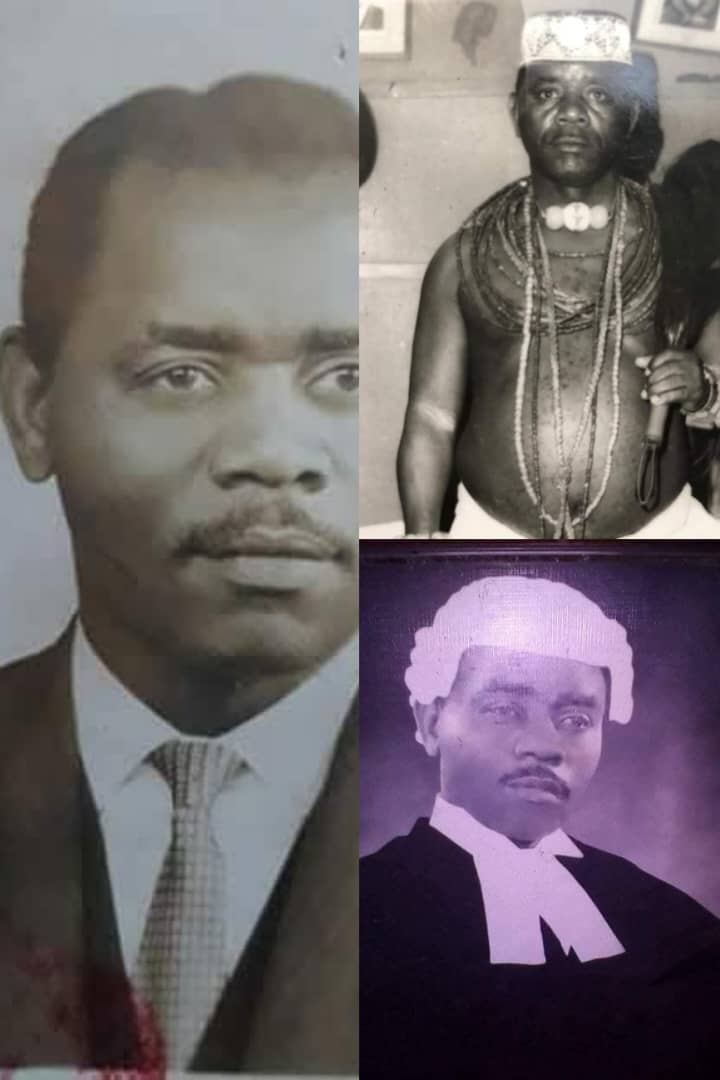
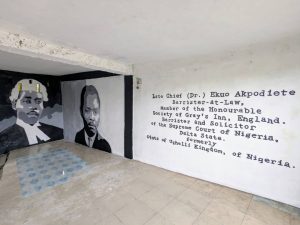
In a life of achievement, Chief Ekuogbe Akpodiete popularly called the Duke by his contemporaries in the UK was an assessment clerk, post office clerk, a court interpreter, an educationist, a business man, a political party chieftain, a Barrister and Solicitor, a Magistrate, the Otota (the Prime Minister) of Ughelli kingdom which is the highest traditional chieftaincy office that underpin the royal office of the Ovie of Ughelli Kingdom.
He was a trail blazer, a strict disciplinarian, a lover of people, and a philantropist. He saw to it that people lived in peace and happiness.
Born on the 4th of April, 1924, to parents cut from an industrious mould, Chief Ekuogbe Rowland Gregory Akpodiete took zealously to education that neither his mother Ughweriaka who was a trader, nor his father Akpodiete who was a farmer had.
He attended the Native Authority Primary School, Ughelli, and Enitona High School, Port Harcourt, for his secondary school education.
He thereafter had a brief teaching career in primary schools in Ofuoma near Ughelli, he worked as a process clerk in the then Sapele Township Department between 1950 and 1953, serving at the same time as an interpreter in the local courts.
He proceeded to the United Kingdom to seek the proverbial Golden Fleece where he worked and paid his way through, studying Law. He was admitted into the Honourable society of Gray’s Inn, England, in 1965, and shortly after, he returned home to Nigeria and attended the Nigerian Law School. He was called to the Nigerian Bar in 1966. He immediately started practice in Lagos. However, his practice in Lagos was regrettably abridged by the Nigerian Civil War, which drove him to his hometown Ughelli in 1967, where he continued to practise among his kith and kin as the first Legal Practitioner.
Chief Ekuogbe Akpodiete established himself in Ughelli. After the civil war, he served in the now defunct Mid-western State Judiciary from 1972 to 1975 as a Magistrate.
He was conferred with the chieftaincy title of Urhukperovie of Ughelli kingdom (the light of the King) by the then reigning Ovie of Ughelli, His Royal Highness Oharisi II of blessed memory in 1977.
In the quest for more knowledge, he went back to England for his Master’s degree in law (LL.M) and later a Ph.D. at the University of Warwick.
He was awarded an honourary doctorate degree (Ph.D) by Tenesse Christian University from the United States of America in 1991.
He became the Otota (the Prime Minister) of Ughelli Kingdom in 1986, an office he occupied until his demise on 9th April 1995.
Chief Ekuogbe Akpodiete was also politically involved. In the heady days of the Awolowo-led Unity Party of Nigeria, he was the party’s legal adviser in Ughelli and was on hand to assist during Chief Obafemi Awolowo’s campaign hosting in Ughelli and its environs.
In view of his love for people and entertainment, he established a popular cinema house, one of the first in Ughelli, known as REGA cinema, coined from his names, alongside an entertainment place called Unutakunu (people talk to people).
Chief Ekuogbe Akpodiete was blessed with wives and many children, grandchildren, and great grand children.
Mr. Olotu Akpodiete, PhD
Executive Director
Olotu & Ekuogbe Rowland Akpodiete foundation
-
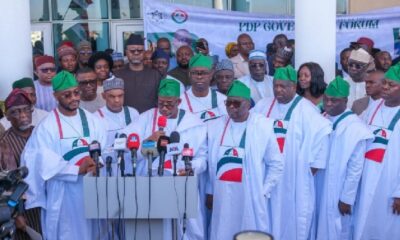
 News21 hours ago
News21 hours agoPDP governors declare support for Tinubu
-
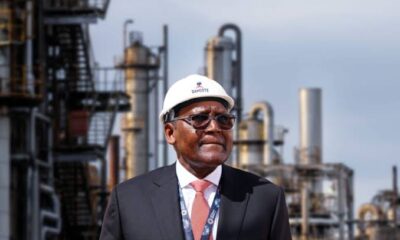
 News22 hours ago
News22 hours agoHope for Nigerians as Dangote refinery slashes petrol price again
-

 News22 hours ago
News22 hours agoRivers Emergency Rule: Abbas inaugurates 21-member panel
-
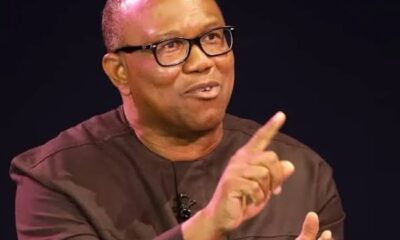
 News24 hours ago
News24 hours agoPeter Obi asks president Tinubu to suspend France trip
-

 News21 hours ago
News21 hours agoN1.3trn CBEX Scam: EFCC caution Nigerians against Ponzi Schemes
-

 News8 hours ago
News8 hours agoFG expresses sympathy for CBEX victims, urges a united effort to combat Ponzi schemes
-
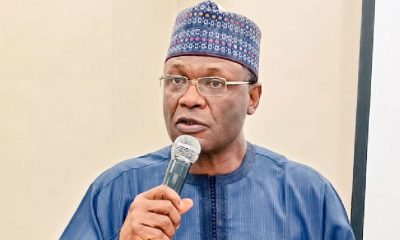
 News24 hours ago
News24 hours agoINEC chair, Yakubu calls on African youths to promote peaceful elections
-
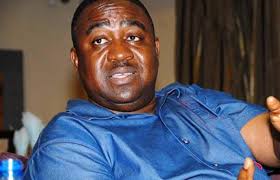
 News21 hours ago
News21 hours agoSuswan kicks as PDP governors reject merger talks

















